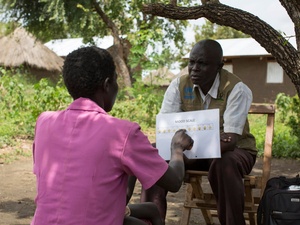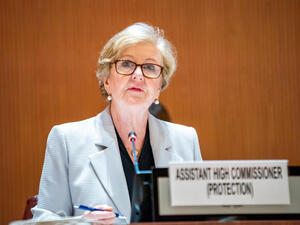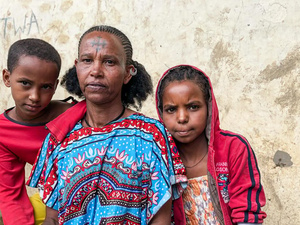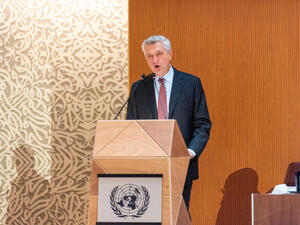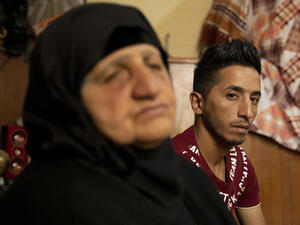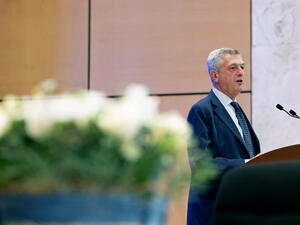Ogata opens 48th annual UNHCR Executive Committee session
Ogata opens 48th annual UNHCR Executive Committee session
UN High Commissioner for Refugees Sadako Ogata appealed Monday to governments to respect humanitarian principles, and called UNHCR's commitment to defending and promoting the fundamental rights of refugees "non-negotiable".
Opening the 48th annual meeting of UNHCR's Executive Committee in Geneva, Ogata said the world was experiencing a crisis in the application of humanitarian principles, not a failure of the principles themselves. The Executive Committee, of which 53 states are members, has adopted the "challenge of refugee repatriation" as its central theme this year.
Drawing lessons from her Office's experience in the Great Lakes region of Africa, the High Commissioner said that if states had "fulfilled their responsibilities as stipulated by this very Committee, and supported UNHCR's actions more firmly and decisively, some of the problems we encountered could have been avoided."
"The rights of refugees asylum and non-refoulement are the foundation of my mandate and I wish to reaffirm our non-negotiable commitment to defend and promote them."
The crisis in the implementation of fundamental humanitarian principles is not limited to a single region, Ogata said. She reiterated her serious concern at the "increasing trend towards restrictive asylum policies in many Western countries, including rejection of asylum seekers at borders, interdiction at sea and the narrow interpretation of the refugee definition, including its limitation to persecution by state actors."
Ogata expressed her hope that the world was now entering a period of declining refugee emergencies. The number of persons of concern to UNHCR at the beginning of 1997 was 22.7 million, down 1.3 million since early 1996. While the integration of refugees in their countries of asylum and resettlement of refugees to third countries are vital solutions to refugee problems, repatriation remains the primary option.
There were a number of positive developments during 1997: UNHCR recently completed the repatriation of almost 300,000 Togolese refugees; assisted 20,000 internally displaced Chechens to go back to their homes; and helped refugees to return to countries as diverse as Myanmar, Tajikistan and Guatemala. The High Commissioner hoped that political developments in Angola, Liberia, the Horn of Africa and in Western Sahara would open up prospects for large-scale returns in the months to come.
Nonetheless, 1997 demonstrated more clearly than ever before how complex the challenge of refugee repatriation is. "The greatest and gravest challenges to protection" the High Commissioner said, "have occurred in the Great Lakes region". Ogata traced the root of the problem back to "the inability or unwillingness of the international community [in 1994] to separate those who deserved international protection from those who did not". After the refugee camps in the former Zaire were destroyed in November 1996, around 600,000 Rwandans returned spontaneously, and UNHCR and its partners called for an international military force to assist in rescuing the others. This request was not met. While aid agencies managed to help an additional 250,000 Rwandans to return from former Zaire, including 65,000 in an arduous airlift operation conducted by UNHCR during May - September 1997, thousands of others died in the forest, "of hunger, exhaustion, disease" or "at the hands of military forces."
The High Commissioner stressed that repatriation involves more than just logistics. Repatriation can only be durable and sustainable if refugee rights including basic human rights and justice are restored. The situation in Bosnia and Herzegovina, "exemplifies the variety of reintegration challenges": physical safety must be assured, including the removal of land mines; the result of elections must be accepted; and those who committed crimes against humanity must be brought to justice. Unless UNHCR's work is "part of an integrated strategy for rehabilitation and reconciliation", she said, "its impact is likely to be insufficient."
The High Commissioner expressed her deep concern at the absence of progress towards peace and reconciliation in certain areas, such as Burundi, Sierra Leone and Afghanistan. She pointed out that "continued civil conflict and measures restricting human rights and particularly the rights of women," have virtually halted repatriation to Afghanistan. New refugee flows in recent weeks were a worrying development, including the arrival in Thailand of at least 40,000 refugees from fighting in Cambodia and the flight of thousands of civilians in the face of conflict in the Republic of Congo (Brazzaville).
UNHCR's budget for 1998 is likely to be under one billion US dollars for the first time since 1991, Ogata announced. Nonetheless she reminded governments that her Office's General Programmes for 1997 remain seriously underfunded, with a projected shortfall of $50 million. She pointed out that protection work is resource-intensive, especially if staff are to be on the ground to monitor the welfare of returnees.
Calling the challenges to her Office "daunting and formidable," the High Commissioner paid special tribute to UNHCR staff as well as staff of other agencies who have lost their lives or suffered grave injury in the service of uprooted people. She warned that "there will be more casualties, particularly among the very vulnerable national staff, if unarmed civilian aid workers continue to work alone in the forefront of humanitarian disasters. They are without adequate protection, often in situations where the international community believes it may be too dangerous even to send military forces."


